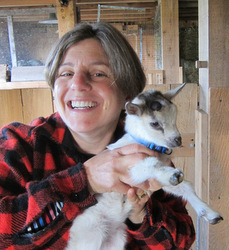 It’s finally here! Bring yours to the Holiday Party on December 10th to taste how different makers make different cheese.
It’s finally here! Bring yours to the Holiday Party on December 10th to taste how different makers make different cheese.
That means we all have to make our cheese at the same time: the week of October 15th should give enough time for it to age. Ready, set….
If you’re licensed, and you’re willing to donate your left-overs to the Guild after the party, we’ll be selling them to Maine cheese retailers as a Guild fundraiser.
Good luck and have fun!
——
Here’s a link to a PDF file of the Havarti Recipe for better printing.
Havarti
From Dave Potter (DCI) Workshop, ACS Conference 2012
Milk should be around 4.8% butterfat; add cream if necessary.
Heat treat milk, then bring to 90degF
Add culture @ 5 DCU per 100 pounds milk: Probat 222, OR CHN 22, OR Mesophilic Aromatic B, OR MM100 plus LM57, OR Flor Danica that’s been cultured overnight
Add Calcium Chloride at rate of 30ml/1000 pounds of milk
Add color (optional) at rate of 3ml/1000 pounds of milk
After 45 minute ripening cultures, add rennet (single strength at 75ml/1000 pounds milk) diluted 40x
Measure floculation and wait 2.5x to 3x (firmer to softer cheese) — around 45 minutes total from renneting — before cutting.
Cut into 3/8″ pieces, then let heal for 5 minutes.
Stir slowly for 20 minutes.
Remove whey = to 1/3 original milk volume.
Add hot water (145degF) in same amount as removed to raise the vat temp to 102degF final cook temp.
Stir 30 minutes
Remove 40% of whey (which is less than the first remove).
Stir until curd is “firm curd” and a handful starts to stick together well, another 30 minutes, typically ending 90 minutes after cutting.
Hoop every mold, then immediately turn every cheese and place with the follower DOWN so it presses itself by its own weight. Ideally it drains in the bottom of an empty vat to keep the curd temp up.
Turn every 15 minutes for an hour.
Turn every hour until the pH is 5.8 – 6.0.
(If you’re making 20 pound wheels, you may want to chill your cheese overnight in a 50degF acidified (pH 5.2) water bath with 2oz/1000 pounds water of CaCl added.)
Otherwise place in saturated brine for 2.5-3.0 hours per lb. of cheese depending on desired salt content. Alternatively, rub cheese wheels with coarse flake dry salt once per day for each 3-4 lb. of cheese.
Air dry the cheese until it can be waxed, or vacuum sealed.
Wheels are aged at 50-55degF and 85-90% RH
If you wish to have a natural rind you will need to wash it with a coarse cloth or semi-firm brush dipped in 2-3 % brine solution. The solution is applied every other day and the cheeses are turned over. After approx. 30 days it is possible wash and turn the cheeses every 3-4 days. At this time the rind should be turning the characteristic orange color, which indicates the growth of Brevibacterium linens. After 60 days it is possible to use a dry brush for cleaning.
 It’s finally here! Bring yours to the Holiday Party on December 10th to taste how different makers make different cheese.
It’s finally here! Bring yours to the Holiday Party on December 10th to taste how different makers make different cheese. 